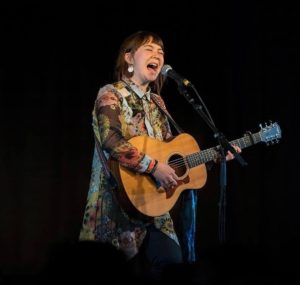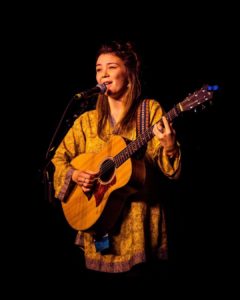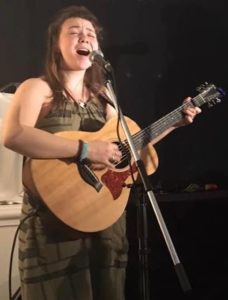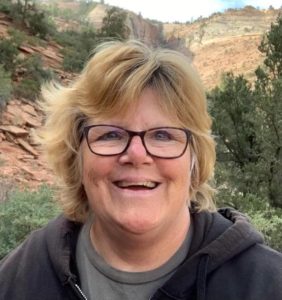By Kathy Sands-Boehmer
Annie Sumi is an ethereal folk artist from Canada, whose intimate and expansive music invites listeners into a familiar otherworld. Inspired by the mirrored relationship between physical and emotional landscapes, the young, Ontario-based singer-songwriter’s music speaks of human experience through the language of the senses. She has toured across Canada, parts of the U.S. and Europe, and released three albums since 2015. Kathy Sands-Boehmer, chief innovator and merry-maker at Harbortown Music, recently asked Annie Sumi some questions about her music — including her latest recording, Solastagia, which was released last fall.

Annie Sumi showcases her talents during the 2018 Northeast Regional Folk Alliance (NERFA) Conference (Photo: Jake Jacobson)
Annie’s musical imagination soars in all her recordings but this latest offering is far and away her best yet. Annie articulates her love of nature and humankind, and it comes through in each and every note. A native of Whitby, Ontario, Annie has been playing her contemporary folk songs to audiences for the past several years and has won over artists from coast to coast. Her style definitely evokes an ethereal sense of wisdom beyond her years. Annie has collected numerous nominations for new and emerging artists in Canada and as music writer Sarah Greene of Exclaim says: “Sumi’s music has a mystical bent. With her pure voice, finger-picked guitar, and smiling banter, she communicated joy and wonder.” My humble advice: check out her music and find yourself a nice, comfortable place to just be in the present and listen to her. You’ll feel refreshed and happy that you did so after taking the time to listen. For more information about Annie, visit her website. Look for upcoming shows with Annie and Travis Knapp.
Here’s a video of “Over the Hills” which will give you an excellent glimpse into Annie Sumi’s music.
Can you please to explain the Rainer Maria Rilke quote “I live my life in widening circles that reach out across the world” that sits atop your website home page. Is it the making of your music that makes this quote resonate with you?
This quote reminds me of the ways that sound reverberates out into the world. It also brings up images of when you drop a stone into a quiet lake, and the water ripples out – on and on – touching the distant shores. I suppose ruminating on this quote helps me to remember that every little thing that we do reaches out across the world energetically, and it inspires me to ‘drop stones in the water’ with good intention.
Tell us about your upbringing in Canada. Did you gravitate towards music at an early age? If so, did you pick up any musical instruments at that time and did you start to experiment with them?
I started learning piano when I was around six years old, and it was really fun until I got bored of playing classical music and found myself gravitating to more popular songs. I usually credit the singing to my Scottish heritage because everyone who came in and out of my Grannie’s house had to sing a “wee” song – that definitely encouraged the silly, playful, and performative parts of me! It wasn’t until I was in high school that I started experimenting on guitar. I took some lessons at the local school, The Music Scene, and then began writing my own tunes.
Did the fact that you are of mixed race affect your musical outlook on life? Did you have any particular influences that inspired you?
I like to think that the Scottish part of my family inspired the performative, sing-songy side of my writing; and, perhaps, the Japanese part of my family inspired the introspective, poetic parts of my writing! I think I am still understanding how being of mixed-race has informed my creative life, and the ways that I am interested in deepening my relationship to my ancestors.
Listening to your newest album, Solastalgia was a perfect opportunity for me to concentrate deeply on your music and appreciate the beautiful sounds and timely lyrics. I chose not to read anything about your album before listening and it brought me great comfort to realize that I had, in fact, tuned into your world and sonically experienced what you must have felt as you were creating the songs in Banff. Tell us a bit about your experience writing the songs amidst the beauty and wonders of Alberta.
Spending time in the mountains was profoundly beautiful. The landscape inspires so much awe – a perfect space to inhabit while writing. At the time I was writing this album, I was walking with grief and trying to soften the hard edges of my heart toward a deeper wisdom. I was in the throes of “global dread” and “environmental anxiety”, but, after reading Glenn Albrecht’s Earth Emotions, I felt more equipped to “name” my grief and walk beside it without allowing it to overtake me. Writing these songs were part of my process in rediscovering hope, awe, and wonder for this beautiful earth, and inspiration to continue trying to find meaningful ways of meeting the urgent call towards action.

Annie Sumi performs during the 2018 NERFA Conference (Photo: Ethan Baird)
Joanna Macy has been an abundant well of inspiration and resource on my own journey of remembering. She often talks about how we cannot grieve or stand up for something that we do not love, or see ourselves connected to… For that reason alone, I feel like the most essential thing we can do as a species is to reconnect with the natural world and open our hearts to its beauty. Perhaps, then, as a collective, we would feel inspired to stand up against the capital-driven injustices that threaten these wild spaces and recognize that the people that have been protecting these lands deserve physical and financial support, media visibility, and national acknowledgment.
I was particularly taken with the meditative beginning track, “Circles” and how it works as a welcome to the rest of the album and slides smoothly into “Over the Hills.” The songs are very calming and speak to the listener as a way of imaging the people who inhabited the earth years and even centuries in the past. Did your imagination run wild as you created these songs?
This is a fun question! Ha-ha! My imagination tends to run wild, and this collection of songs definitely cultivated a space for the imagination to thrive! But I wasn’t thinking a lot about people that have inhabited this earth in the past… in fact, a lot of these songs were written with an intention to be as present as possible. I was hoping that it would inspire listeners to feel the power, magic, whimsy, desperation and joy accessible in this moment, and feel awake to their lives.

Annie Sumi (Photo: Michael Kornfeld)
Definitely. ‘Mother’ speaks to the body of the earth, and inquires if there is still time to rise and meet the challenges we face related to the declining climate. It was written in a moment when I was physically unable to stand up in protest, so I felt compelled to write this song.
Can you give us some insight into your song “Fleur?” I love the strong female characterization! I love the power in your voice–you set the tone perfectly but I want to know what prompted you to write this intriguing song.
“Fleur” was inspired by Louise Erdich’s character in her novel Tracks. The character depicts a strong, Indigenous woman that is connected to some primordial powers that allow her to retaliate against her oppressors. “Fleur” was so intriguing that I felt compelled to write about her journey and the ferocity of her character.
How would you compare the music on Solastalgia to the songs on your other albums?
I think Solastalgia is the most conceptual body of work that I have written up to this point. I had a very clear idea of how to weave textures throughout the album that linked the beginning, middle, and end. I wonder if writing 80% of this album in the same place contributed to the thematic nature of the album!
Is there any kind of musical project that you would love to do that you haven’t done yet?
There are hundreds of musical projects that I would love to do and haven’t done yet! So, I will report back when those snippets of experimental sounds come into fruition in some way!

Kathy Sands-Boehmer

Like/Follow Us!